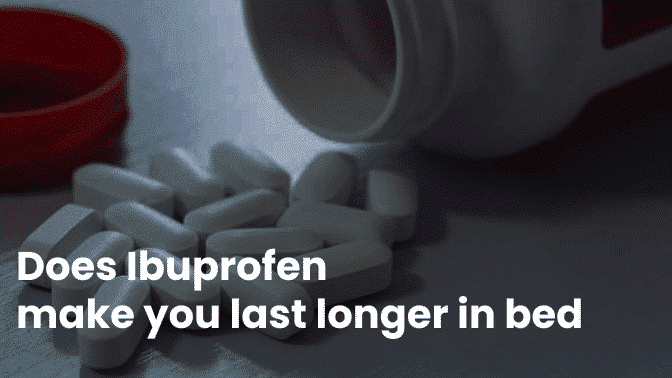There are various rumours floating around the internet about the effects of ibuprofen on sexual performance. Some people believe that taking ibuprofen can increase your sexual stamina and help you last longer in bed. However, is there any truth to this claim? In this article, we will explore whether or not ibuprofen can help you last longer in bed.
What is Ibuprofen and How Does It Work?
Firstly, it’s important to understand what ibuprofen is and how it works. Ibuprofen is a nonsteroidal anti-inflammatory drug (NSAID) that is commonly used to reduce pain and inflammation in the body. It works by blocking the production of prostaglandins, which are chemicals that cause inflammation, pain, and fever in the body.
While ibuprofen can help to alleviate pain and inflammation, there is no evidence to suggest that it can improve sexual performance or help you last longer in bed. In fact, taking ibuprofen may actually have the opposite effect on sexual function.
One of the side effects of ibuprofen is that it can interfere with the production of testosterone in the body. Testosterone is a hormone that is essential for sexual function in men and women. Low testosterone levels can lead to a decrease in libido, erectile dysfunction, and other sexual problems.
In addition to affecting testosterone levels, ibuprofen can also cause other sexual sides effects such as decreased sperm count and fertility problems in men. In women, ibuprofen can interfere with ovulation and menstrual cycles.
Furthermore, taking ibuprofen in high doses or for long periods of time can lead to other health problems such as stomach ulcers, kidney damage, and heart disease. It is important to always follow the recommended dosage and talk to your doctor before taking ibuprofen or any other medication.
Read Also: Quiz: From Your Kids Nose To Their Toes. Do You Know How Their Body Works?
Other Sexual Side Effects of Ibuprofen
Ibuprofen is a widely used nonsteroidal anti-inflammatory drug (NSAID) that is commonly used to relieve pain and inflammation. However, while it may be effective in treating these symptoms, it can also have negative side effects on sexual function.
In addition to decreasing testosterone levels, as discussed in the previous section, ibuprofen can also affect sperm count and fertility in men and interfere with ovulation and menstrual cycles in women.
Sperm count is a critical component of male fertility. A low sperm count can lead to difficulty in conceiving and may also indicate underlying health problems. Studies have shown that taking high doses of ibuprofen for an extended period of time can decrease sperm count and motility in men.
One study, published in the journal Proceedings of the National Academy of Sciences, found that men who took ibuprofen for just two weeks experienced a significant reduction in testosterone production and a decrease in sperm count. The researchers concluded that regular use of ibuprofen could lead to male infertility.
In addition to affecting sperm count, ibuprofen can also cause fertility problems in men by interfering with the production of prostaglandins, which are essential for sperm production. Prostaglandins are also involved in the process of ovulation in women.
In women, ibuprofen can interfere with ovulation and menstrual cycles. Ovulation is the process by which an egg is released from the ovary and travels down the fallopian tube, where it can be fertilized by sperm. Prostaglandins play a key role in this process by triggering the release of the egg.
Ibuprofen can interfere with the production of prostaglandins, which can lead to irregular ovulation and menstrual cycles. This can make it more difficult for women to conceive and may also lead to other menstrual problems, such as heavy or painful periods.
Other ways that can make you last longer in bed
1. Desensitizers,
Your penis’ feelings might be lessened using desensitising lotions and gels. Regrettably, the majority of these lotions may also desensitise your partner’s tissues. It is advised to remove the items from the penis before penetration as a result.
According to Asandra, there is one item he suggests, called Promescent, that absorbs enough so that your companion is unaffected.
When using a desensitizer, you should be aware that most of these lotions and gels include local anaesthetics, which may be harmful if used excessively or repeatedly. Always adhere to the instructions on the product, or even better, see a physician before using one to discuss the advantages and disadvantages of desensitizers.
2. Adult mutilation
Adult circumcision, or the removal of the foreskin, is a radical remedy.
A 2015 research found that circumcised individuals had positive outcomes. Several participants in the research reported feeling more in control of when they ovulated or that having been circumcised had a beneficial impact on premature ejaculation, it was noticed.
In other words, speaking with a doctor with expertise in circumcisions may help you determine whether this approach is appropriate for you if you discover that you have difficulties lasting and have an uncircumcised penis.
3. Mobilization
Masturbation might assist in halting early ejaculation. You could discover that you can postpone your orgasm during sex with your spouse if you masturbate just before your planned sexual intercourse with them.
Masturbation may also be used as a form of therapeutic massage. Penis-root masturbation may help you postpone your orgasm, according to a small study. They discovered that increasing the amount of time it took to ejaculate during sex involved stimulating the root of the penis up until the time was right and then easing off.
4. Discover your ideal weight
Maintaining a moderate weight may help you perform better in bed if you notice you’re ejaculating too early. According to a 2017 study by Trusted Source, people who have three or more of the following conditions are more likely to ejaculate early:
5. elevated blood pressure
low “good” cholesterol 40-inch or larger waist circumference elevated blood sugar levels
triglyceride levels in the bloodletting the underlying issue may be helpful, according to Werthman, since we are aware that obesity, high blood pressure, and diabetes are major contributors to erectile dysfunction.
6 Alter your diet
You may be able to postpone ejaculation by making some dietary changes.
Werthman claims that some particular foods may raise the level of free testosterone in your body, which is essential for a healthy erection.
He stated that certain foods, such as the herb fenugreek, can raise free testosterone. Actually, the substance known as Testofen, which is present in many over-the-counter supplements, is derived from fenugreek.
Additionally, you might want to completely avoid vaginal sex. Approximately 18% of people with vaginas claim to be able to orgasm from direct penetration, according to a 2017 study. Other sexual activities may make you and your partner feel satisfied because the rest required direct clitoris stimulation to cause an orgasm.
Conclusion
There is no evidence to suggest that ibuprofen can help you last longer in bed. While it may alleviate pain and inflammation, taking ibuprofen can also have negative effects on sexual function and overall health.
It is important to always talk to your doctor before taking any medication and to explore other ways to improve sexual performance and stamina.
Some natural ways to improve sexual function include getting enough sleep, exercising regularly, eating a healthy diet, and reducing stress levels.
[bwla_faq single=”1″ fpid=”35739″/]





